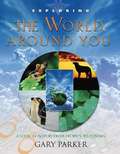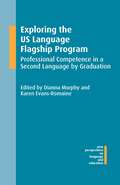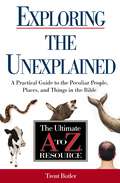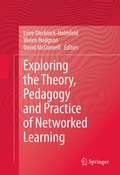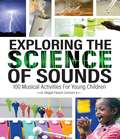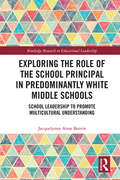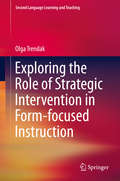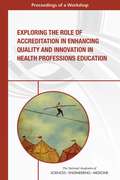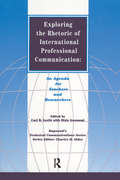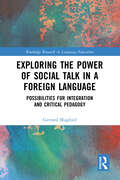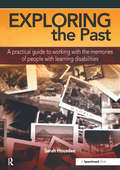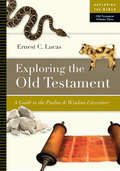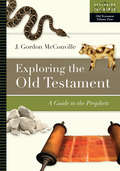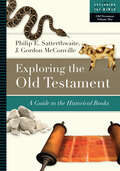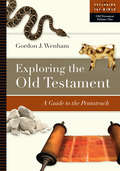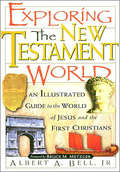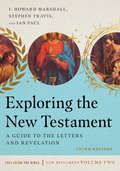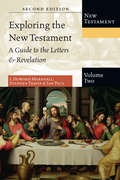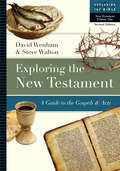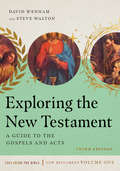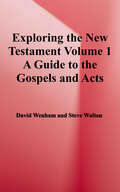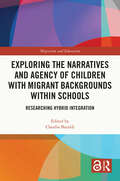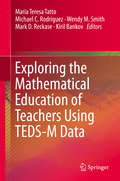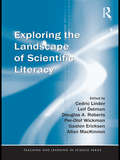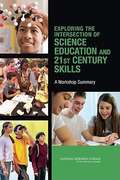- Table View
- List View
Exploring the World Around You
by Dr Gary ParkerIt has been said that our planet is really just an insignificant speck in a vast universe, but that's not true! In fact, the conditions for life found on earth are supremely unique and make our life here comfortable. This despite the reality that the world around us is also tainted and in need of careful calibration in order to continue. This scripturally founded book opens a window to the spectacular environments found on our planet, from deserts to the tropics, with respect to creationism. Researchers and biologist Dr. Garry Parker brings his vast knowledge of ecology to a teaching setting, exploring and explaining ecosystems, population growth, habitats, adaptations, energy problems, and much more. Learn about insect control in California, why mammals have fur, and how sharks maintain "friendships" with small fish know as remora. Exploring the World Around You brings the varieties of our planet's habitats alive to the reader, and is a wonderful learning tool complete with illustrations, chapter tests, and an index.
Exploring the US Language Flagship Program: Professional Competence in a Second Language by Graduation
by Dianna Murphy Karen Evans-RomaineA number of reports in the US have highlighted the country's need for improved second language skills for both national security and economic competitiveness. The Language Flagship program, launched in 2002, aims to raise expectations regarding language proficiency levels at the post-secondary level and to address structural gaps in the curricula of many L2 programs. This federally funded program provides opportunities for US undergraduate students in any specialization to reach a professional level of competence in a targeted second language by graduation. This volume highlights innovative practices that enable students to achieve this goal - even those with no exposure to the second language prior to university. This book explores the rationale and history of the federal program and showcases models and strategies of existing Flagship programs.
Exploring the Unexplained: A Practical Guide to the Peculiar People, Places, and Things in the Bible
by Trent ButlerHave you ever wondered about those giants in Genesis or that reference to Enoch in Jude? Exploring the Unexplained: A Practical Guide to the Peculiar People, Places, and Things in the Bible answers all your questions about unusal, hard-to-explain, and difficult-to-understand stories in the Bible. Learn more about people like Enoch, Moses, and the Nephilim. As with other books in Thomas Nelson's A to Z series, Exploring the Unexplained helps you gain a deeper understanding of the Bible in an easy-to-read format. Features include: Scripture index Topical index Easy-to-understand explanations of some of the Bible's most confusing stories A convenient tool for individual and group study
Exploring the Theory, Pedagogy and Practice of Networked Learning
by David Mcconnell Lone Dirckinck-Holmfeld Vivien HodgsonThis book will be based on a selection of high quality research papers presented at the Networked Learning Conference, May3-4, 2010. The Networked Learning Conference is an international, research-based conference. Since its inception in 1998 the conference has developed a strong following by international researchers. In addition it is well supported by practitioners, managers and learning technologists interested in contributing to and hearing about research in this area. The conference is considered a major event in the international 'technology enhanced learning' conference circuit. This edited volume presents cutting edge research that will explore current trends and advances in research on networked learning, technology enhanced learning and e-learning.
Exploring the Science of Sounds: 100 Musical Activities for Young Children
by Abigail Flesch ConnorsMost preschool teachers have musical instruments in their classrooms, but may not realize they can use them for science explorations. Science, technology, engineering, arts, and math—STEAM—these explorations are crucial for laying a solid foundation for later learning. In this book, discover 100 activities that let children ages 3–6 explore the science of music and sound using materials easy to find for a preschool classroom. Children will use their bodies to create sounds, explore the relationship between size and pitch, investigate how tempo affects the way we listen to sounds, create musical instruments, and much more. From the drops of rainwater to the tinkling of wind chimes, the science of sound is all around. You will indulge young children’s curiosity and engage them in scientific inquiry as they explore, listen, observe, experiment, think, and discuss different kinds of sounds and the tools for making them. Through playful activities, explore: Acoustics—what is sound? Volume—loud and soft Tempo—fast and slow Timbre—sound quality Pitch—high and low
Exploring the Role of the School Principal in Predominantly White Middle Schools: School Leadership to Promote Multicultural Understanding (Routledge Research in Educational Leadership)
by Jacquelynne Anne BoivinBy detailing an explanatory sequential mixed methods study grounded in Critical Race Theory (CRT), this book explores the role of effective educational leadership in developing multicultural acceptance in predominantly white schools. Drawing on the rich experiences and accounts of school principals in rural middle schools in the US, the volume asks how principals’ personal attitudes, professional experiences, and the degree to which they view themselves as a mentor and influencer within the school impacts their approach to improving multicultural understanding amongst students, staff, and faculty. The text is organized into five clear chapters, providing critical reflections, a review of the relevant literature, and in-depth discussion of first-hand data. Six key findings relating to whole-school acceptance, the role of individual principal’s attitudes, and support for teaching staff open new avenues for research and inform recommendations for the professional development of school principals. In presenting key theory and practical implications of research, this book will be crucial reading for researchers, scholars, and practitioners in the fields of educational leadership, multicultural education, sociology of education, and teacher education.
Exploring the Role of Strategic Intervention in Form-focused Instruction
by Olga TrendakThe monograph is devoted to the notion of strategic intervention and its application in the foreign language classroom, in particular with reference to teaching grammar structures. The first four chapters, which are theoretical in nature, address such concepts as form-focused instruction, language learning strategies and strategies-based instruction. The last chapter provides insight into the results of a study investigating the grammar learning strategies employed by advanced learners of English. Additionally, the chapter presents the views of foreign language teachers on the idea of introducing strategy training in the foreign language classroom. The book closes with the discussion concerning the implementation of strategy training and its value in teaching target language grammar.
Exploring the Role of Accreditation in Enhancing Quality and Innovation in Health Professions Education: Proceedings of a Workshop
by National Academies of Sciences Engineering MedicineThe purpose of accreditation is to build a competent health workforce by ensuring the quality of training taking place within those institutions that have met certain criteria. It is the combination of institution or program accreditation with individual licensure—for confirming practitioner competence—that governments and professions use to reassure the public of the capability of its health workforce. Accreditation offers educational quality assurance to students, governments, ministries, and society. Given the rapid changes in society, health, and health care, the National Academies of Sciences, Engineering, and Medicine hosted a workshop in April 2016, aimed to explore global shifts in society, health, health care, and education, and their potential effects on general principles of program accreditation across the continuum of health professional education. Participants explored the effect of societal shifts on new and evolving health professional learning opportunities to best ensure quality education is offered by institutions regardless of the program or delivery platform. This publication summarizes the presentations and discussions from the workshop.
Exploring the Rhetoric of International Professional Communication: An Agenda for Teachers and Researchers (Baywood's Technical Communications)
by Carl R. Lovitt Dixie GoswamiPresents a collection of fourteen essays that responds to the need for a more rhetorical conception of professional communication as an international discipline. This book challenges the adequacy of relying on preconceived notions about the factors that determine discourse in international professional settings.
Exploring the Power of Social Talk in a Foreign Language: Possibilities for Integration and Critical Pedagogy (Routledge Research in Language Education)
by Gerrard MugfordThis book examines the fundamental interactional dimension to foreign language communication, including the establishment, development, consolidation and maintenance of interpersonal relations. It argues that interpersonal language use such as small talk, casual conversation and gossipy talk is not only key to meaningful and productive communication but that it is an essential dimension with respect to successful foreign language interaction and that engaging in interpersonal language is communicatively valuable and worthwhile in its own right. Crucially, it explores how teaching and learning can utilize the role of social talk and relational engagement in helping interactants to express, voice and convey their own values, attitudes and beliefs. Finally, it develops a critical relational pedagogy focused on language speakers’ needs, objectives and desires. Redressing the imbalance between transactional and interactional language teaching, and stressing the importance of phatic and relational language use in helping language users achieve their communicative goals, it will appeal to researchers, postgraduates, and scholars in the fields of education and linguistics.
Exploring the Past: A Practical Guide to Working with the Memories of People with Learning Disabilities
by Sarah HousdenWorking from the premise that the lives of people with learning disabilities are of innate value, and that exploring and celebrating people's experiences demonstrates their value in a practical way, this book provides a manual on working with memories in groups and individually. It includes: a clear rationale for and guidance on the benefits of this approach; good practice guidelines for memory work; a chapter on life story work with individuals; a section on working with those with learning disabilities and dementia; ideas for dozens of activities on 15 themes associated with memories of the past, including - the childhood years; food, cooking and shopping; days out and holidays; fashions, clothing and looking good; and, hobbies, interests and work experience.
Exploring the Old Testament: A Guide to the Psalms Wisdom Literature (Exploring the Bible Series #Volume 3)
by Ernest C. LucasIsrael's poets and sages left a scriptural legacy that has powerfully shaped the worship, thoughts and actions of the people of God. In the highs and lows and crossroads of life, we instinctively turn to their poetry, proverbs and discourses for the language we do not possess and the wisdom we desperately seek. Yet there is more to this literature than meets the eye--or fills the momentary need. A study of the Bible's wisdom and poetry will dramatically enhance its power and effectiveness. From the depths of lament to the heights of praise, from the eroticism of the Song of Songs to the hard realism of Ecclesiastes, and from the aphorisms of Proverbs to the discourses of Job, this guide introduces readers to the ancient background, the literary artistry, and the varied and timeless messages of the Psalms and Wisdom literature. Ernest C. Lucas gives us an informed, illuminating and interactive introduction to this portion of Scripture. Sparkling with interest and geared to the needs of students, this is an excellent textbook introduction to the Psalms and Wisdom literature.
Exploring the Old Testament: A Guide to the Prophets (Exploring the Bible Series #Volume 4)
by J. Gordon McConvilleExploring the Old Testament: A Guide to the Prophets considers the often misunderstood prophetic books of the Old Testament, including an exploration of their historical context, their artful use of language and their place within the chorus of Old Testament voices. This critically informed and theologically sensitive introduction to the Prophets introduces students to issues in critical interpretation the place of the prophetic books in the Old Testament canon the social location of biblical prophets contemporary applications of the prophetic books dates and destinations of the prophecies of each of the books theological contributions of the prophetic books an overview of literary criticism on the Prophets In this textbook you will find double-column formatting for ease of use, annotated bibliographies for further reading, sidebar explorations of select historical and textual topics in greater detail, a glossary of terms, and relevant charts and maps.
Exploring the Old Testament: A Guide to the Historical Books (Exploring the Bible Series #Volume 2)
by Philip E. Satterthwaite J. Gordon McConvilleThe historical books, from Joshua to Ezra and Nehemiah, form the narrative backbone of the Old Testament. Without them the Pentateuch would stop cold and the Prophets would hang in suspension. Even the Psalms and Wisdom literature would lose some of their luster for lack of a setting. Without these historical books the New Testament would be resolving an incomplete narrative, answering a question only half and hesitantly posed. For all these reasons and more, it is a tragic fact that many of us today cannot give a brief and coherent account of this story. We fear that books with names like Judges, Kings and Chronicles would bore us. But nothing could be further from the truth. For the story they tell is full of action and intrigue, tragedy and suspense, vivid characters and memorable events. They are the stuff of great art and literature, and they have inspired men and women to lives and deeds of uncommon faith and courage. Exploring these books is essential for a true education, whether religious or otherwise. In this guidebook, Philip E. Satterthwaite and J. Gordon McConville introduce us to the content and the context of these historical books. We view them within the setting of ancient history and history writing, and come to appreciate their literary artistry, their role within the Scriptures of Israel, and their lasting value as theological and ethical resources. Designed especially for students, Exploring the Old Testament, Volume 2: A Guide to the Historical Books overflows with interesting and helpful features that encourage avid exploration and the joy of learning.
Exploring the Old Testament: A Guide to the Pentateuch (Exploring the Bible Series #Volume 1)
by Gordon J. WenhamExploring the Old Testament: A Guide to the Pentateuch offers a clear overview of the "five books of Moses," as well as an introduction to the historical and textual questions that modern scholarship has posed and the answers it has proposed. This critically informed, textually sensitive introduction to the Pentateuch introduces students to the basic features of the Pentateuch the social world of the Bible the latest scholarship on the composition of the Pentateuch literary techniques and forms theme, composition and rhetorical function of the Pentateuch In this textbook you will find double-column formatting for ease of use, annotated bibliographies for further reading, sidebar explorations of select historical and textual topics in greater detail, a glossary of terms, and relevant charts and maps.
Exploring the New Testament World
by Albert BellThe timeless message of the New Testament applies to people of every culture and generation. Yet there is great value in understanding the world in which that message was first revealed - its social manners, politics, religious customs, and culture. Exploring the New Testament World, written by classics and Bible scholar Dr. Albert A. Bell, Jr., illuminates the living context of the New Testament, immersing its readers in the intriguing world of Jesus and the early church. An authority on ancient Greek and Roman language, culture, and history, Dr. Bell writes in a readable style that is accessible and enjoyable to any reader - an uncommon accomplishment among New Testament scholars today. Surveying Jewish factions of the era, the social and political structure of the Roman Empire, and the philosophies and religions that surrounded the early church, Dr. Bell helps his readers learn to think like first-century Jews, Greeks, and Romans, illuminating puzzling New Testament passages for clear understanding. Comprehensive Scripture and Subject Indexes make this volume even more useful as a "manners and customs" Bible companion. This authoritative guide receives high praise from college professors and Sunday school teachers alike, proving its appeal to both popular and academic audiences. A "must-have" reference for every pastor and an indispensable resource to any Bible reader.
Exploring the New Testament: A Guide to the Letters and Revelation (Exploring the Bible Series #Volume 2)
by I. Howard Marshall Ian Paul Stephen TravisJewish and Greco-Roman backgroundPaul's life, mission, and theologythe structure and major themes of each bookissues of authorship, date, and settingmethods in reading and interpreting the Letters and Revelationthe intersection of New Testament criticism with contemporary issues of faih and culturethe theological links between Jesus and Paulthe way New Testament authors read the Hebrew Scripturesthe contribution of archaeology to New Testament studiesupdated bibliographies highlighting the most important and influential works published in the last decade
Exploring the New Testament: A Guide to the Letters and Revelation (Exploring the Bible Series #Volume 2)
by I. Howard Marshall Stephen Travis Ian PaulProfessors and students will warm to this clearly written and well-informed introduction to the New Testament Letters and the Apocalypse. Exploring the New Testament, Volume Two introduces students of biblical studies and theology to Greco-Roman background ancient letter writing content and major themes Paul's life, mission and theology issues of authorship, date and setting methods in reading and interpreting the New Testament Letters and Revelation the intersection of New Testament criticism with contemporary issues of faith and culture This revised edition features updated text and bibliographies, and incorporates new material gleaned from the experience of classroom use.
Exploring the New Testament: A Guide to the Gospels and Acts (Exploring the Bible Series #Volume 1)
by Steve Walton David WenhamEspecially suited for introductory courses that focus on Jesus and the Gospels or the Gospels and Acts, Exploring the New Testament, Volume One introduces students to Jewish and Greco-Roman background literary genres and forms debated issues such as authorship, date and setting content and major themes of each book conventional as well as new approaches to the study of the Gospels and Acts the latest scholarship in the quest for the historical Jesus the intersection of New Testament criticism with contemporary faith and culture This revised edition features updated text and bibliographies, and incorporates new material gleaned from the experience of classroom use.
Exploring the New Testament: A Guide to the Gospels and Acts (Exploring the Bible Series #Volume 1)
by Steve Walton David WenhamJewish and Greco-Roman backgroundliterary genres and formsissues of authorship, date, and settingthe content and major themes of each bookvarious approaches to the study of the Gospels and Actsthe intersection of New Testament criticism with contemporary faith and culturethe impact of social memory theory on Gospel studiesthe relationship of John's Gospel to the Synopticsrecent work on characterization in narrative studies of the Gospelsthe way the Hebrew Scriptures are read by the New Testament authorsthe contribution of archaeology to New Testament studiesupdated bibliographies highlighting the most important and influential works published in the last decade
Exploring the New Testament: A Guide to the Gospels and Acts (Exploring The Bible Ser.)
by David Wenham Steve WaltonWritten by scholars with extensive experience teaching in colleges and universities, the Exploring the Bible series has for decades equipped students to study Scripture for themselves. Exploring the New Testament, Volume One provides an accessible introduction to the Gospels and Acts. It's filled with classroom-friendly features such as discussion questions, charts, theological summary sidebars, essay questions, and further reading lists. This volume introduces students to -Jewish and Greco-Roman background -literary genres and forms -issues of authorship, date, and setting -the content and major themes of each book -various approaches to the study of the Gospels and Acts -the intersection of New Testament criticism with contemporary faith and culture Now in its third edition, this popular textbook has been updated and revised to take account of the latest advances in scholarly findings and research methods, including new sections on -the impact of social memory theory on Gospel studies -the relationship of John's Gospel to the Synoptics -recent work on characterization in narrative studies of the Gospels -the way the Hebrew Scriptures are read by the New Testament authors -the contribution of archaeology to New Testament studies -updated bibliographies highlighting the most important and influential works published in the last decade Especially suited as a textbook for courses on Jesus, the Gospels, or Acts, this book is a valuable guide for anyone seeking a solid foundation for studying the New Testament.
Exploring the Narratives and Agency of Children with Migrant Backgrounds within Schools: Researching Hybrid Integration (Migration and Education)
by Claudio BaraldiThis edited volume presents the results of a European research project – ‘CHILD-UP’ (Children Hybrid Integration: Learning Dialogue as a way of Upgrading Policies of Participation), which analyses the hybrid integration of children with migration backgrounds into schools across Europe. Using qualitative data and theoretical foundations obtained through interviews and focus groups, the book ultimately centres the perspectives and experiences of both the children and the professionals working with them. In doing so, it explores the complex position migrant children occupy in host societies, their exercise of agency, challenges and inspirational local practices that support hybrid integration and innovative educational planning. It also analyses the facilitation of conversations concerning children’s personal experiences and social relations, second language learning and language mediation, based on video- and audio-recordings of school activities. The book will be of relevance to researchers, academics, scholars, and faculty in the fields of sociology of education, child development, migration and multicultural studies.
Exploring the Mathematical Education of Teachers Using TEDS-M Data
by Maria Teresa Tatto Michael C. Rodriguez Wendy M. Smith Mark D. Reckase Kiril BankovThis book uses the publicly available TEDS-M data to answer such questions as: How does teacher education contribute to the learning outcomes of future teachers? Are there programs that are more successful than others in helping teachers learn to teach mathematics? How does the local and national policy environment contribute to teacher education outcomes? It invites readers to explore these questions across a large number of international settings. The importance of preparing future mathematics teachers has become a priority across many nations. Across the globe nations have allocated resources and expertise to this endeavour. Yet in spite of the importance accorded to teacher education not much is known about different approaches to preparing knowledgeable teachers and whether these approaches do in fact achieve their purpose. The Mathematics Teacher Education and Development Study (TEDS-M) is the first, and to date the only, cross-national study using scientific and representative samples to provide empirical data on the knowledge that future mathematics teachers of primary and secondary school acquire in their teacher education programs. The study addresses the central importance of teacher knowledge in learning to teach mathematics by examining variation in the nature and influence of teacher education programs within and across countries. The study collected data on teacher education programs structure, curriculum and opportunities to learn, on teacher educators’ characteristics and beliefs, and on future mathematics teachers’ individual characteristics, beliefs, and mathematics and pedagogical knowledge across 17 countries providing a unique opportunity to explore enduring questions in the field.
Exploring the Landscape of Scientific Literacy (Teaching and Learning in Science Series)
by Cedric LinderScientific literacy is part of national science education curricula worldwide. In this volume, an international group of distinguished scholars offer new ways to look at the key ideas and practices associated with promoting scientific literacy in schools and higher education. The goal is to open up the debate on scientific literacy, particularly around the tension between theoretical and practical issues related to teaching and learning science. Uniquely drawing together and examining a rich, diverse set of approaches and policy and practice exemplars, the book takes a pragmatic and inclusive perspective on curriculum reform and learning, and presents a future vision for science education research and practice by articulating a more expansive notion of scientific literacy.
Exploring the Intersection of Science Education and 21st Century Skills: A Workshop Summary
by National Research Council of the National AcademiesAn emerging body of research suggests that a set of broad "21st century skills"--such as adaptability, complex communication skills, and the ability to solve non-routine problems--are valuable across a wide range of jobs in the national economy. However, the role of K-12 education in helping students learn these skills is a subject of current debate. Some business and education groups have advocated infusing 21st century skills into the school curriculum, and several states have launched such efforts. Other observers argue that focusing on skills detracts attention from learning of important content knowledge. To explore these issues, the National Research Council conducted a workshop, summarized in this volume, on science education as a context for development of 21st century skills. Science is seen as a promising context because it is not only a body of accepted knowledge, but also involves processes that lead to this knowledge. Engaging students in scientific processes--including talk and argument, modeling and representation, and learning from investigations--builds science proficiency. At the same time, this engagement may develop 21st century skills. Exploring the Intersection of Science Education and 21st Century Skills addresses key questions about the overlap between 21st century skills and scientific content and knowledge; explores promising models or approaches for teaching these abilities; and reviews the evidence about the transferability of these skills to real workplace applications.
